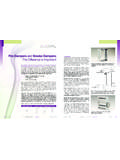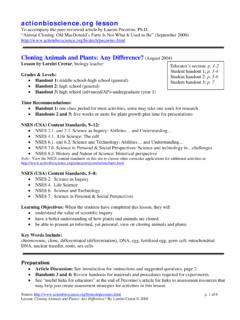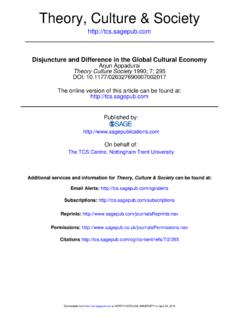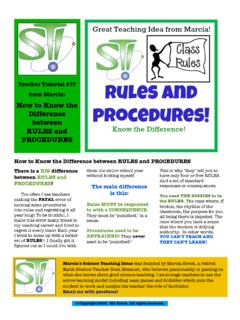Transcription of Does Psychology Make a Significant Difference in Our Lives?
1 Does Psychology make a Significant Differencein Our Lives? Philip G. ZimbardoStanford UniversityThe intellectual tension between the virtues of basic versusapplied research that characterized an earlier era of psy-chology is being replaced by an appreciation of creativeapplications of all research essential to improving thequality of human life. Psychologists are positioned to givepsychology away to all those who can benefit from ourwisdom. Psychologists were not there 35 years ago whenAmerican Psychological Association (APA) PresidentGeorge Miller first encouraged us to share our knowledgewith the public. The author argues that Psychology isindeed making a Significant Difference in people s lives;this article provides a sampling of evidence demonstratinghow and why Psychology matters, both in pervasive waysand specific applications.
2 Readers are referred to a newlydeveloped APA Web site that documents current opera-tional uses of psychological research, theory, and method-ology (its creation has been the author s primary presiden-tial initiative): Psychology matter? Does what we do, andhave done for a hundred years or more, reallymake a Significant Difference in the lives of indi-viduals or in the functioning of communities and nations?Can we demonstrate that our theories, our research, ourprofessional practice, our methodologies, our way of think-ing about mind, brain, and behavior make life better in anymeasurable way? Has what we have to show for our dis-cipline been applied in the real world beyond academia andpractitioners offices to improve health, education, welfare,safety, organizational effectiveness, and more?Such questions, and finding their answers, have al-ways been my major personal and professional , as an introductory Psychology teacher for nearly sixdecades, I have always worked to prove relevance as wellas essence of Psychology to my students.
3 Next, as an authorof the now classic basic text, Psychology and Life(Ruch &Zimbardo, 1971), which claimed to wed Psychology to lifeapplications, I constantly sought to put more Psychology inour lives and more life in our Psychology (Gerrig & Zim-bardo, 2004; Zimbardo, 1992). To reach an even broaderstudent audience, I have coauthoredCore Concepts inPsychology(Zimbardo, Weber, & Johnson, 2002) thatstrives to bring the excitement of scientific and appliedpsychology to students in state and community order to further expand the audience for what is bestin Psychology , I accepted an invitation to help create, bescientific advisor for, and narrator of the 26-program PBSTV series,Discovering Psychology (1990/2001). For thisgeneral public audience, we have provided answers asviewable instances to their so what? questions. Thisaward-winning series is shown both nationally and inter-nationally (in at least 10 nations) and has been the foun-dation for the most popular telecourse among all the An-nenberg CPB Foundation s many academic programs ( ).
4 Finally, as the 2002 president of theAmerican Psychological Association, my major initiativebecame developing a compendium of exemplars of howpsychology has made a Significant Difference in our Web-based summary of Psychology in applied ac-tion has been designed as a continually modifiable andupdateable repository of demonstrable evidence of psycho-logical knowledge in meaningful applications. In a latersection of this article, the compendium will be describedmore fully and some of its examples was fortunate in my graduate training at Yale Uni-versity (1954 1960) to be inspired by three exceptionalmentors, each of whom modeled a different aspect of therelevance and applicability of basic Psychology to vitalissues facing individuals and our society. Carl Hovlanddeveloped the Yale Communication and Attitude ChangeProgram after coming out of his military assignment inWorld War II of analyzing the effectiveness of propagandaand training programs (Hovland, Lumsdaine, & Sheffield,1949).
5 He went on to transform what was at that time acomplex, global, and vague study of communication andpersuasion into identifiable processes, discrete variables,and integrative hypotheses that made possible both exper-imental research and applications (Hovland, Janis, &Editor s note. Philip G. Zimbardo was president of APA in 2002. Thisarticle is based on his presidential address, delivered in Toronto, Canada,at APA s 111th Annual Convention on August 9, 2003. Award addressesand other archival materials, including presidential addresses, are peerreviewed but have a higher chance of publication than do unsolicitedsubmissions. Presidential addresses are expected to be expressions of theauthors reflections on the field and on their terms as president. Both thisaddress and that of Robert J. Sternberg, the 2003 APA president, werepresented at this convention to catch up on the year lag that had developedin the last decade of giving presidential s concerning this article should be ad-dressed to Philip G.)
6 Zimbardo, Department of Psychology , StanfordUniversity, Building 430, Mail Code 380, Stanford, CA 94305. August 2004 American PsychologistCopyright 2004 by the American Psychological Association 0003-066X/04/$ 59, No. 5, 339 351 DOI: , 1953). Neal Miller always straddled the fence be-tween basic and applied research, despite being known forhis classic experimental and theoretical formulations ofmotivation and reward in learning and conditioning. HisWorld War II experience of training pilots to overcomefears so that they could return to combat was an appliedprecursor of his later role in developing biofeedbackthrough his laboratory investigations of conditioning auto-nomic nervous system responses (N. E. Miller, 1978, 1985,1992). The last of my Yale mentors, Seymour Sarason,moved out from his research program on test anxiety inchildren into the community as one of the founders ofCommunity Psychology (Sarason, 1974).
7 It was a daringmove at that time in afield that honored only the scientificstudy of the 50s was also afield that honoredbasic research well above applied research, which wastypically accorded second-class status, if not denigrated bythe experimentalists, a popular brand name in that at many major universities aspired to be softphysics, as in the heady days of our Germanic forebears,Wundt, Fechner, Ebbinghaus, Titchner, and others (seeGreen, Shore, & Teo, 2001). Anything applied was seen atbest as crude social engineering by tinkerers, not realthinkers. Moreover, behaviorism was still rampant, withanimal models that stripped away from learning what non-sense syllable memory researchers had deleted from mem-ory merely the context, the content, the human meaning,and the culture of behavior. The most prominent psychol-ogist from the 50s through the 80s, Skinner, was ananomaly in this regard.
8 Half of him remained a Watsonianradical behaviorist who refused to admit the existence ofeither motivation or cognition into his Psychology (Skin-ner, 1938, 1966, 1974). Meanwhile, the other Skinner sideapplied operant conditioning principles to train pigeons formilitary duties and outlined a behaviorist utopia inWaldenTwo(Skinner, 1948).Giving Psychology Away: The Call forSocietal AccountabilityAnd then along came George Miller whose American Psy-chological Association (APA) presidential address in 1969stunned the psychological establishment because one of itsownfirst-born sons committed the heresy of exhortingthem to go public, get real, get down, give it up, and berelevant. Well, that is the way I think I heard it back thenwhen George Miller (1969) told his audience that it wastime to begin to give Psychology away to the public.
9 Itwas time to stop talking only to other psychologists. It wastime to stop writing only for professional journals hiddenaway in library stacks. It was time to go beyond the endlessquest for experimental rigor in the perfectly designed studyto test a theoretically derived hypothesis. Maybe it wastime to beginfinding answers to the kinds of questions yourmother asked about why people acted the way they it was acceptable to start considering how best totranslate what we knew into a language that most ordinarycitizens could understand and even come to for one applauded George Miller s stirring call toaction for all these reasons. It was heady for me because Ibelieved that coming from such a distinguished serioustheorist and researcher not some do-gooder, liberal com-munitarian whom the establishment could readily dis-miss his message would have a big impact in , the banner raised by Miller s inspirational speechdid notfly very high over most Psychology departments formany years to come.
10 Why not? I think for four reasons:Excessive modesty aboutwhatpsychology really had ofvalue to offer the public, ignorance aboutwhowas thepublic, cluelessness abouthowto go about the mission ofgiving Psychology away, and lack of sufficient concernaboutwhypsychology needed to be accountable to shall we counterargue against such reasoning?First, scanning the breadth and depth of ourfield makesapparent that there is no need for such professional mod-esty. Rather, the time has come to be overtly proud of ourpast and current accomplishments, as I will try to demon-strate here. We have much to be proud of in our heritageand in our current accomplishments. Second, the publicstarts with our students, our clients, and our patients andextends to our funding agencies, national and local politi-cians, all nonpsychologists, and the media.






